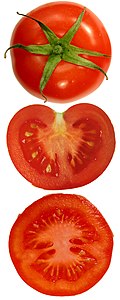A locule (pl.: locules) or loculus (Latin for 'little place'; pl.: loculi) is a small cavity[1] or compartment within an organ or part of an organism (animal, plant, or fungus).
In angiosperms (flowering plants), the term locule usually refers to a chamber within an ovary (gynoecium or carpel) of the flower and fruits. Depending on the number of locules in the ovary, fruits can be classified as unilocular (uni-locular), bilocular, trilocular, or multilocular. The number of locules present in a gynoecium may be equal to or less than the number of carpels. The locules contain the ovules or seeds.
The term may also refer to chambers within anthers containing pollen.[2]
In ascomycetous fungi, locules are chambers within the hymenium in which the perithecia develop.[3]
References
[edit]- ^ "loculus". Oxford Dictionaries. Archived from the original on July 18, 2012.
- ^ Hickey, M.; King, C. (2001). The Cambridge Illustrated Glossary of Botanical Terms. Cambridge University Press.
- ^ "Fungi Glossary". Palaeos.com. Archived from the original on 2015-11-18. Retrieved 2016-05-04.
| Subdisciplines | |||||||||||
|---|---|---|---|---|---|---|---|---|---|---|---|
| Plant groups | |||||||||||
| Plant anatomy |
| ||||||||||
| Plant physiology Materials | |||||||||||
| Plant growth and habit | |||||||||||
| Reproduction | |||||||||||
| Plant taxonomy | |||||||||||
| Practice | |||||||||||
| |||||||||||
This plant morphology article is a stub. You can help Wikipedia by expanding it. |










